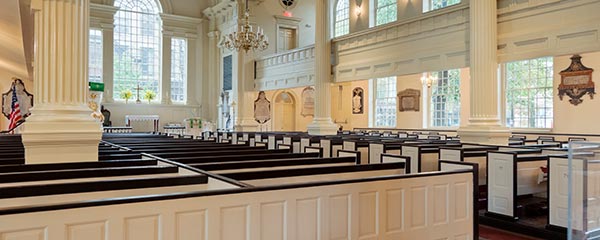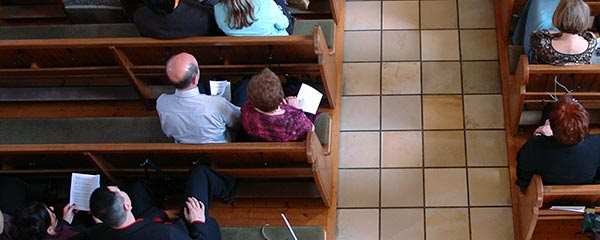Story Highlights
- 74% believe in God, 69% angels, 67% heaven, 59% hell, 58% the devil
- Nearly three in 10 do not believe in hell or the devil
- Belief greatest among frequent churchgoers, Protestants, Republicans
WASHINGTON, D.C. -- The percentages of Americans who believe in each of five religious entities -- God, angels, heaven, hell and the devil -- have edged downward by three to five percentage points since 2016. Still, majorities believe in each, ranging from a high of 74% believing in God to lows of 59% for hell and 58% for the devil. About two-thirds each believe in angels (69%) and heaven (67%).
Gallup has used this framework to measure belief in these spiritual entities five times since 2001, and the May 1-24, 2023, poll finds that each is at its lowest point. Compared with 2001, belief in God and heaven is down the most (16 points each), while belief in hell has fallen 12 points, and the devil and angels are down 10 points each.
This question asks respondents whether they believe in each concept or if they are unsure, and from 13% to 15% currently say they are not sure. At the same time, nearly three in 10 U.S. adults do not believe in the devil or hell, while almost two in 10 do not believe in angels and heaven, and 12% say they do not believe in God.
As the percentage of believers has dropped over the past two decades, the corresponding increases have occurred mostly in nonbelief, with much smaller increases in uncertainty. This is true for all but belief in God, which has seen nearly equal increases in uncertainty and nonbelief.
In the current poll, about half of Americans, 51%, believe in all five spiritual entities, while 11% do not believe in any of them. Another 7% are not sure about all of them, while the rest (31%) believe in some and not others.
Gallup periodically measures Americans’ belief in God with different question wordings, producing slightly different results. While the majority of U.S. adults say they believe in God regardless of the question wording, when not offered the option to say they are unsure, significantly more (81% in a survey conducted last year) said they believe in God.
Belief Highest Among Frequent Churchgoers, Protestants and Republicans
Frequent churchgoers, Protestants (including nondenominational Christians) and Republicans are the most likely subgroups to say they believe in the five spiritual entities.
Other notable findings:
- Protestants are more likely than Catholics to believe in each of the five entities; however, broad majorities of Catholics still believe in each. The Protestant-Catholic differences are smaller on belief in God and angels than on heaven, hell and the devil. In both religious groups, the minority of people who do not express belief in God are more likely to say they are unsure than express nonbelief. In contrast, no more than 25% of Americans without any religious affiliation believe in any of the spiritual concepts, and they are more likely to express nonbelief rather than uncertainty.
- Majorities of adults who attend religious services at least monthly -- particularly those who attend weekly -- express belief in each of the five concepts. Most of those who seldom or never attend believe in God and angels, but less than half believe in heaven, hell and the devil.
- Between 78% and 87% of Republicans believe in the five entities, while 51% to 68% of independents do. From 56% to 66% of Democrats believe in God, angels and heaven, while less than half say they believe in hell and the devil.
- Americans with annual household incomes under $40,000 are more likely than those with incomes of at least $100,000 to believe in each of the entities. Yet, majorities in the two higher-income groups believe in each spiritual concept.
- Adults aged 55 and older are most likely to believe in each of the concepts, but majorities of those in the 35 to 54 age range also believe in the five. Fewer of those aged 18 to 34 believe in each of the five concepts, but majorities profess belief in all but the devil.
- Women are more likely than men to believe in all of the spiritual concepts except for the devil, which 58% of both groups say they believe in.
- Adults without a college degree are more likely than college graduates to believe in each of the five entities.
Belief in the five spiritual entities has declined among most of these subgroups since 2001 but has held relatively steady among weekly and nearly weekly or monthly church attendees, Protestants, and Republicans.
Bottom Line
Gallup has documented sharp declines in church attendance, confidence in organized religion and religious identification in recent years. Americans’ beliefs regarding God, angels, heaven, hell and the devil have also fallen by double digits since 2001. Still, U.S. adults’ belief in each entity remains at the majority level, and regular churchgoers, Protestants and Republicans, in particular, remain largely resolute in their beliefs.
To stay up to date with the latest Gallup News insights and updates, follow us on Twitter.
Learn more about how the Gallup Poll Social Series works.
View complete question responses and trends (PDF download).




